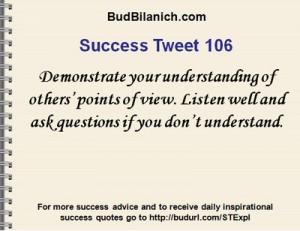 My friend, Pamela Culpepper, gave me an interesting book a couple of years ago: Turning to One Another: Simple Conversations to Restore Hope for the Future. Margaret Wheatley is the author. Dr. Wheatley is an alumna of one of my alma maters – the Harvard Graduate School of Education (we both did our doctoral work there) and the author of one of the most innovative leadership books I’ve ever read, Leadership and the New Science. If you haven’t read it, I suggest that you check it out.
My friend, Pamela Culpepper, gave me an interesting book a couple of years ago: Turning to One Another: Simple Conversations to Restore Hope for the Future. Margaret Wheatley is the author. Dr. Wheatley is an alumna of one of my alma maters – the Harvard Graduate School of Education (we both did our doctoral work there) and the author of one of the most innovative leadership books I’ve ever read, Leadership and the New Science. If you haven’t read it, I suggest that you check it out.
In Turning to One Another, Dr. Wheatley outlines six points for effective conversation. Notice how, in one way or another, all six focus on being a better listener.
- Acknowledge one another as equals.
- Stay curious about one another.
- Recognize that we need each other’s help to become better listeners.
- Slow down to have the time to think and reflect.
- Remember that conversation is the natural way for humans to think together.
- Expect it to be messy at times.
Here is my take on these six common sense points.
- Acknowledge one another as equals. You cannot have a good conversation if you don’t recognize one another as equals. Regardless of your hierarchical relation to the other person – if he or she is your boss, peer or subordinate – remember that we are all human beings. As such, we are entitled to respect and dignity. Talk with people, not to them and you’ll be surprised at the quality of your discussions.
- Stay curious about one another. People are fascinating. I have had some of the most interesting conversations with limo and cab drivers. Often they are immigrants. It’s interesting to hear their take on life in the USA. Be curious about the people you know, too. People are always growing and changing. When you express your curiosity you’ll be bound to find out new and interesting things about old friends and acquaintances.
- Recognize that we need each other’s help to become better listeners. Help others listen. Think before you speak. Speak clearly. Ask them questions; answer the questions they ask you. Remember, communication in general and conversation in particular is a process fraught with potential misconnects. So listen hard to others and make it easy for them to listen to you.
- Slow down to have the time to think and reflect. When you slow down, you do indeed have time to think. Don’t be afraid to pause and reflect on a question. This shows the other person that you are carefully considering your response – not just saying the first thing that comes to mind. Other people will appreciate you for your thoughtfulness, not knock you for not being quick or clever enough.
- Remember that conversation is the natural way for humans to think together. I love this one – “conversation is the natural way for humans to think together.” The idea of “thinking together” is great career advice. The world would be a better place if we all “thought together” instead of thinking separately and trying to convince others that our thoughts are better than theirs. Since this is the season, I would love to see political debates where the candidates worked together to develop an approach to handling a problem or issue – instead of watching them advance their ideas while taking swipes at the other person’s ideas.
- Expect it to be messy at times. Conversation is messy. That’s OK. In fact, I think it’s great. Some of the best ideas come out of messy conversations. The willingness to get into the mess and slop around is what frees your creativity.
I really like Turning to One Another. It provides some great career advice on conversation and listening. If you’re interested in becoming a better conversationalist – and you should be – pick it up, read it and think about what Dr. Wheatley has to say. More important, put her ideas to use.
The common sense career success coach point here is simple. Successful people are great conversationalists. They follow the advice in Tweet 106 in Success Tweets. “Demonstrate your understanding of others’ points of view. Listen well and ask questions if you don’t understand.” Listening takes a little bit of work, but it is worth it in the long run. It will help you become a dynamic communicator and build solid relationships that will fuel your life and career success. Remember Meg Wheatley’s six points for conversation success. They are great career advice. 1) Acknowledge one another as equals; 2) Stay curious about one another; 3) Recognize that we need each other’s help to become better listeners; 4) Slow down to have the time to think and reflect; 5) Remember that conversation is the natural way for humans to think together; 6) Expect it to be messy at times.

Speak Your Mind